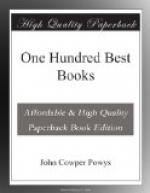Oliver Onions’ humor has that large and vigorous expansiveness, touched with something almost sardonic, which we associate with some of the very greatest writers. There is always present in his work a certain free sweep of imagination which deals masterfully and suggestively with all manner of sordid material.
99. ARNOLD BENNETT. CLAYHANGER.
“Clayhanger” with its sequels, “Hilda Lessways” and “These Twain,” makes up an imposing and convincing trilogy of middle-class life in the English Pottery Towns. To these books should be added “Old Wives’ Tale,” “Anna of the Five Towns” and all the others among this writer’s works which deal with these Pottery places he knows so superbly well.
Outside the Five Towns Mr. Bennett loses something of the power of his touch. He is an interesting example of a writer with a definite “milieu” out of whose happy security he is always ill-advised to stray.
But within his own region he is a powerful master. No one in modern English fiction has treated so creatively and illuminatingly the least interesting and least romantic strata of human society which is perhaps to be found in the whole world.
And yet he endows this paralyzing bourgeoisie with astonishing life. One turns back from much more exciting literature to these ignorant, conceited, restricted and undistinguished people.
One turns back to them because Mr. Bennett shows one the tragic humanity, eternally and mysteriously fascinating, to be found beneath these vulgar and unlovely exteriors. Nor when it comes to the problem of sex itself is this writer less of a master. Never has the undying conflict, the world-old struggle, between those who, in the Catullian phrase, “love and hate” at the same time, been more convincingly brought into the light than in the relations between these uninteresting but strangely appealing people.
Arnold Bennett’s knowledge of the Five Towns gives to his work a background of significant congruity whose interaction upon the characters of his plots has the same kind of weight and portentousness as the interaction of Nature in the books of Mr. Hardy.
Such a background may be in itself materialistic and sordid, but in the imaginative reaction it produces upon the characters it has the genuine poetic quality.
100. OXFORD BOOK OF ENGLISH VERSE.
This is by far the best anthology of English poetry, its only rival being the first series of Palgrave’s Golden Treasury. Those interested in the work of more recent poets and in the latest poetic “movements” in England and America would be wise to turn to Putnam’s “Georgian Poetry”—two series—and “The New Poetry” by Harriet Monroe, published by Macmillan. The compiler of this selection of books feels himself that the most poetical among the younger poets of our age is Walter de la Mare and of the poems which Mr. de la Mare has so far written, he finds the best to be those extraordinary and magical verses entitled “The Listeners” which seem to come nearer to giving a voice to the unutterable margin of our days than any others written within the last ten years.




